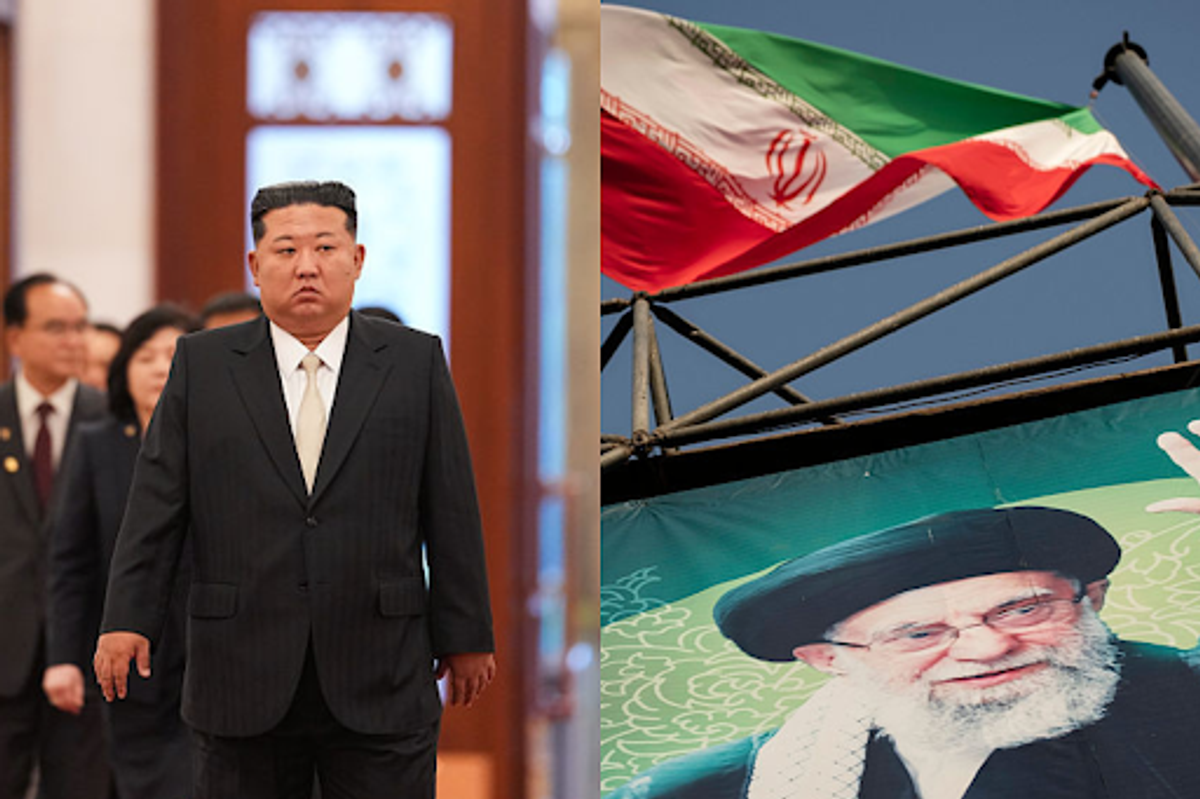DEEP DIVE — The Middle East has changed dramatically since President Donald Trump left office in 2021. An always-tense part of the world has seen an unprecedented act of terrorism against Israel, followed by major wars against Hamas and Hezbollah, and – also unprecedented – Israel and Iran engaged in military strikes against one another. All of which has drawn a major deployment of U.S. military force to the region and raised fears of a full-blown regional conflagration.
“We face the very real danger of a further regional escalation of conflict…the risk of a further escalation between Iran and Israel,” CIA Director William Burns said at last month’s Cipher Brief Threat Conference. If anything, that risk has only heightened since.
Now comes Trump 2.0, and a president-elect pledging at once to back Israel to the hilt, end the wars in Gaza and Lebanon, and draw the U.S. military back from global conflicts. At a minimum, it will be a very difficult needle to thread.
“A second-term Trump administration has the potential to pick up both where the successes and shortcomings in term one left off in the Middle East,” Behnam Ben Taleblu, a senior fellow at the Foundation for Defense of Democracies, told The Cipher Brief. “But this ability will need to be tempered with the realities of the region in 2025.”
Scenario I: An even freer rein for Netanyahu
There have been several signs that U.S. pressure on Israel – which has largely failed to even pause the wars during the Biden Administration – will vanish altogether with Trump back in the White House.
Less than a week before his election victory, Trump reportedly told Israeli Prime Minister Benjamin Netanyahu, “Do what you have to do” in the campaigns against Hamas and Hezbollah. For his part, Netanyahu seemed thrilled with the U.S. results. “This is a huge victory!” Netanyahu posted on X the day after the election. Trump’s “historic return to the White House offers a new beginning for America and a powerful recommitment to the great alliance between Israel and America.”
One of Netanyahu’s cabinet partners, the ultranationalist minister of security Itamar Ben-Gvir, posted a one-word cheer to the news of Trump’s victory: “Yesssss.”
Trump has called himself the best friend Israel has ever had in the White House, and during his first term, he enacted a series of landmark policies in support of Israel. In 2017, he broke with decades of U.S. policy and international consensus by recognizing Jerusalem as Israel’s capital. Trump also championed the Abraham Accords, which led to historic normalization agreements between Israel and four Arab nations. The accords advanced regional alliances but further sidelined prospects for an independent Palestinian state.
According to James Bowden, a longtime Middle East historian and consultant, the Trump win means “the Israelis will likely have much greater freedom of action and far less (Washington) oversight in its conduct, and this will translate into an increase in operations.”
Netanyahu and his right-wing ministers have no doubt also been heartened by Trump’s early national security nominees. Marco Rubio (Trump's choice for Secretary of State), Pete Hegseth (Secretary of Defense), Michael Waltz (National Security Adviser), and Elise Stefanik (U.N. Ambassador) are all staunch and vocal supporters of Israel. And for the post of U.S. ambassador to Israel, Trump has named Mike Huckabee, a former Arkansas governor who has said any Palestinian state should be placed in another Arab country, and that Israel has the “title deed to Judea and Samaria,” using the biblical terms for the West Bank. "There is no such thing as a West Bank," Huckabee told CNN in 2017. “There’s no such thing as an occupation.”
All of which has some Israelis believing Trump may take the unprecedented step of supporting an Israeli annexation of the Israeli-occupied West Bank, a move that would effectively end the prospects of a two-state solution.
Scenario II: Pressuring Netanyahu to end the wars
For all Trump’s statements and his long-standing support for Israel, there are also hints that he may opt for a different approach.
During his campaign, Trump called repeatedly for a swift end to the war in Gaza, expressing his frustration with the ongoing violence and promising to end it. (He also said often that had he been in office, the wars would not have begun – because Hamas would never have attacked Israel). In an interview with conservative radio host Hugh Hewitt in April, Trump urged Israel to “get [the Gaza war] over with and let’s get back to peace and stop killing people.” Trump has also alluded to Israel’s struggle in what he called the “P.R. war,” referring to the global impact of Israel’s killing of tens of thousands of civilians in Gaza.
Trump has also said he would work to end Israel other major campaign, the war on Hezbollah in Lebanon. In the week prior to the election, Trump took to X and pledged to “stop the suffering and destruction in Lebanon” if he were elected.
The challenge for the president-elect: if Trump still has aspirations to broker and end to the Gaza and Lebanon wars, he cannot also encourage Netanyahu to “do what you have do” on those fronts.
And while Trump boasted in 2019 that “the Jewish state has never had a better friend in the White House,” his alliance with Netanyahu has had notable tensions. In 2021, Trump accused Netanyahu of disloyalty, using coarse language, when the Israeli leader congratulated Biden on his election. More recently, following Hamas’ October 7 attack on Israel, Trump publicly criticized Netanyahu and Israeli intelligence for being unprepared.
Finally, there is the military reality of Trump’s view of the world, and how that may inform his policies and actions in the Middle East. “America First” is a fundamentally isolationist stance; and as a candidate, Trump promised to end costly U.S. military deployments. A “free hand” for Netanyahu might well mean a heightened Iran-Israel conflict – which is what has drawn all those U.S. forces to the region.
As Taleblu noted, “Americans still want less, not more, to do with the region.”
The Iran Factor
Trump’s return to the White House is likely to put the regime in Iran – already heavily sanctioned and threatened by further Israeli attacks – under renewed economic pressure.
“The incoming administration recognizes that the primary source of regional instability is Iran,” Jason Brodsky, policy director of United Against Nuclear Iran (UANI), told The Cipher Brief.
As president, Trump took hard-line stands against Iran. His administration pursued a policy of what it called “maximum pressure," imposing new sanctions, abandoning the landmark 2015 Iran nuclear deal, and ordering the assassination in 2020 of General Qassem Soleimani, a commander in Iran’s Islamic Revolutionary Guard Corps.
Brodsky believes the E.U. and U.K. may be more willing to pressure Iran in 2025 than they were in 2017, given that the Iran nuclear deal is dead, and Iran is now arming Russia in its war against Ukraine.
“That has changed European threat perceptions, and this could make it easier to rally an international coalition to isolate Iran,” he added. “Part of the maximum pressure strategy will entail cracking down on Iran’s sanctions evasion and more rigorous enforcement.”
Lester Munson, Advisory Board Member for the National Security Institute at George Mason University, also anticipates that Trump “will pursue a strategy of isolating Iran and building up the relationship between Israel and Sunni Arab states.”
News of Trump’s victory has already sent Iran’s currency, the rial, to an all-time low, signaling market fears of economic instability under an expected return to the “maximum pressure” strategy. Reports suggest Trump’s second administration will also aim to sever Tehran’s oil revenues by targeting foreign ports and traders dealing in Iranian oil. Yet Trump could encounter the same challenge Biden faced in curbing Iran’s oil sales: the risk that reducing global oil supply might drive up prices and trigger inflation.
“Perhaps oil futures markets would allow for a balancing of prices compensating for the loss of Iranian oil, but a temporary spike might have to be the price of achieving the goal of the sanctions,” Bowden said. “If Trump can bring the American public into the process and give them a solid reason and investment into the higher prices, then he can do it with broad support.”
Munson also pointed out that Trump may be willing to endure a spike in oil prices to isolate Iran, but he will “no doubt work to increase production in Saudi Arabia, UAE and other oil exporting countries.”
Many experts noted that Trump is above all things unpredictable – making it even harder than it already is to imagine where the various wars in the Middle East may lead. For the moment, in Israel at least, Netanyahu and his allies appear convinced that Trump will continue to be their “friend” – whether that involves the conflicts in Gaza, Lebanon or with Iran.
As the Ha’aretz newspaper wrote Wednesday, Israel's far-right celebration of Trump’s election “seems to be a never-ending party; the leaders seem to be already punch-drunk with anticipated power and liberation from what they see as the Biden administration’s restraints.”
Read more expert-driven national security insights, perspective and analysis in The Cipher Brief.














